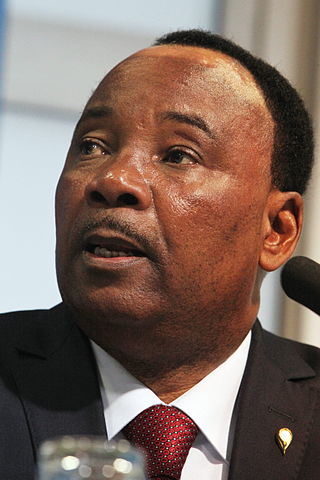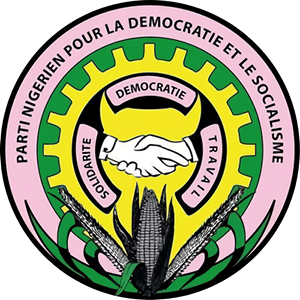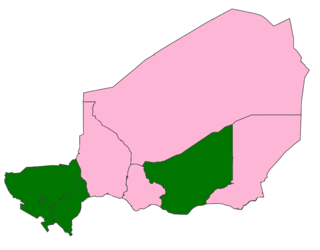 |
|---|
| Judiciary |
Elections in Niger take place within the framework of a semi-presidential system. The President and National Assembly are elected by the public, with elections organised by the Independent National Electoral Commission (CENI).
 |
|---|
| Judiciary |
Elections in Niger take place within the framework of a semi-presidential system. The President and National Assembly are elected by the public, with elections organised by the Independent National Electoral Commission (CENI).
Following World War II, French political reforms meant that Niger began to elect members to the French National Assembly. The first of these elections took place on 21 October 1945, with Niger and neighbouring French Sudan (now Mali) combined into a single constituency. Two MPs were elected using separate electoral colleges for French citizens and Africans. The next elections for the combined constituency held in June 1946. By the November 1946 elections, Niger had become a single-member seat, which was won by Hamani Diori of the Nigerien Progressive Party (PPN).
A General Council was established in the same period and was first elected in December 1946 and January 1947. [1] In 1948 Niger was given a second seat in the French National Assembly, which was filled in a by-election in June that year, with Georges Condat of the Union of Nigerien Independents and Sympathisers elected. French elections were held again in 1951, with both seats won by UNIS. The General Council was converted into the Territorial Assembly in 1952, with the first elections to the new body resulting in a victory for UNIS, which won all 35 Second College seats.
The final French National Assembly election in Niger was held in 1956, with the PPN and an alliance of the Nigerien Action Bloc (BNA) and Nigerien Progressive Union (UPN) of Condat winning one seat each. The 1957 Territorial Assembly elections were won by Sawaba, which took 41 of the 60 seats. However, in early elections the following year, Sawaba was defeated by the Union for the Franco-African Community alliance, which included the PPN.
Upon independence in 1960, the PPN became the sole legal party. The country's first presidential elections were held in September 1965, with Diori as the sole candidate. Parliamentary elections later in the year resulted in the PPN winning all 50 seats. Presidential and parliamentary elections in 1970 were held under the same system with the same result.
A 1974 coup removed the PPN from power, and elections were not held again until 1989, when general elections were called, with the National Movement for the Society of Development (MNSD), established earlier in the year, as the sole party. Ali Saibou (who had been in power since 1987) was re-elected President, with the MNSD winning all 93 seats in the National Assembly. [2]
By 1993 other political parties had been legalised, and the first multi-party parliamentary elections since independence were held in February 1993. [3] The MNSD emerged as the largest party, but won only 29 of the 83 seats; opposition parties subsequently formed the Alliance of the Forces of Change, which had a parliamentary majority. [3] In the presidential elections shortly afterwards, Mahamane Ousmane of the Democratic and Social Convention was elected in the second round, defeating Mamadou Tandja of the MNSD (who had received the most votes in the first round). Following a split in the AFC, early parliamentary elections were held in 1995, [4] but did not significantly alter the makeup of the National Assembly.
A coup in January 1996 led to presidential elections in July, in which coup leader Ibrahim Baré Maïnassara was elected. The National Union of Independents for Democratic Renewal, formed to support him, won an absolute majority in the parliamentary elections later in the year amidst an opposition boycott. [5] Another coup in 1999 led to general elections that year. Tandja was elected president and the MNSD emerged as the largest party in the National Assembly with 38 of the 83 seats. [6] The 2004 elections saw Tandja re-elected and the MNSD remain the largest party. [7]
A 2009 referendum resulted in the constitution being suspended and presidential elections being delayed. The parliamentary elections went ahead, with an opposition boycott allowing the MNSD to win a majority. [8] However, Tandja was removed from office in a 2010 coup and general elections were held in 2011, which saw Mahamadou Issoufou of the Nigerien Party for Democracy and Socialism (PNDS) elected president and the PNDS become the largest party in the National Assembly. [9] Issoufou was re-elected in 2016 general elections, with the second round of the presidential elections boycotted by the opposition. The PNDS made significant gains in the parliamentary elections, but failed to win a majority. [10]
The President is elected for a five-year term using the two-round system. The 171 members of the National Assembly are elected by three methods. The majority, 158, are elected from eight multi-member constituencies based on the seven regions and the Niamey metropolitan region; seats are allocated using the simple quotient and the highest averages method under proportional representation, and there is a 5% electoral threshold. A further eight members are elected from single-member constituencies to represent ethnic minorities, whilst five are elected from single-member constituencies to represent Nigeriens living abroad, with one constituency for each continent. The single member constituencies are elected on a first-past-the-post basis. [11]
During the French colonial era, French citizens in Niger were able to vote in French referendums held in 1945, May 1946 and October 1946. In 1958 a constitutional referendum was held across the French colonial empire; rejection would result in immediate independence, whilst approval would result in the territory joining the French Community. In Niger the referendum was approved by 78% of voters.
The next referendum was held in 1987 on a National Charter that would establish non-elective, consultative institutions at both national and local levels, with official results showing 99.6% voting in favour. A constitutional referendum two years later saw the new constitution approved by a similar margin. Another constitutional referendum in 1992, which proposed reintroducing multi-party democracy, was approved by 90% of voters.
The 1996 coup led to a referendum that saw a new constitution approved by 92% of voters, whilst the 1999 coup resulted in another new constitution receive the approval of 90% of voters. A referendum in 2009 proposed suspending the constitution pending a rewrite, and was approved by 92.5% of voters, although it led to a constitutional crisis that resulted in another coup and another constitutional referendum in 2010, with 90% backing the new constitution.
Humans have inhabited present-day Niger since prehistoric times, with evidence of early activity dating back 60,000 years. The region hosted ancient rock carvings and pastoral communities from 7,000 BCE. Once fertile, it supported large settlements and cattle herding until the climate became arid around 2500 BCE.

Politics of Niger takes place in a framework of a semi-presidential representative democratic republic, whereby the President of Niger is head of state and the Prime Minister of Niger head of government, and of a multi-party system. Executive power is exercised by the government. Legislative power is vested in both the government and the National Assembly.

Hama Amadou is a Nigerien politician who was Prime Minister of Niger from 1995 to 1996 and again from 2000 to 2007. He was also Secretary-General of the National Movement for the Development of Society (MNSD-Nassara) from 1991 to 2001 and President of the MNSD-Nassara from 2001 to 2009. Amadou is from the Kurtey, a Fula sub-group, and was raised in the Tillaberi Region, in the Niger River valley, north of Niamey.

Mamadou Tandja was a Nigerien politician who was President of Niger from 1999 to 2010. He was President of the National Movement for the Development of Society (MNSD) from 1991 to 1999 and unsuccessfully ran as the MNSD's presidential candidate in 1993 and 1996 before being elected to his first term in 1999. While serving as President of Niger, he was also Chairman of the Economic Community of West African States from 2005 to 2007.

Mahamane Ousmane is a Nigerien politician. Elected as the fourth President of Niger at 43 years old, he is the youngest elected president in Africa. He was also the first democratically elected president of his country, serving from 16 April 1993 until he was deposed in a military coup d'état on 27 January 1996. He has continued to run for president in each election since his ouster, and he was president of the National Assembly from December 1999 to May 2009. Since April 2020, he is the president of the Democratic and Republican Renewal, a major political party that is currently in opposition. RDR Tchanji formed an alliance with Ousmane's other political vehicle, MNRD Hankuri, on 16 December 2018.

Mahamadou Issoufou is a Nigerien politician who served as the president of Niger from 7 April 2011 to 2 April 2021. Issoufou was the prime minister of Niger from 1993 to 1994, president of the National Assembly from 1995 to 1996, and a candidate in each presidential election from 1993 to 2016. He led the Nigerien Party for Democracy and Socialism (PNDS-Tarayya), a social democratic party, from its foundation in 1990 until his election as president in 2011. During the presidency of Mamadou Tandja (1999–2010), Issoufou was the main opposition leader.

The National Movement for the Society of Development, also known as the National Movement for the Development of Society is a political party in Niger. Founded under the military government of the 1974–1990 period, it was the ruling party of Niger from 1989 to 1993 and again from 1999 until 2010, when a coup on 18 February 2010, by a military junta called the Supreme Council for the Restoration of Democracy (CSRD), ousted President Mamadou Tandja.

The Nigerien Progressive Party – African Democratic Rally is a political party in Niger. It was the nation's leading political party of the pre-independence era, becoming the sole legal party of the First Republic (1960–1974). It was led by Niger's first President, Hamani Diori. After the end of military rule, the party reappeared as a minor parliamentary party led by Diori's son, Abdoulaye Hamani Diori.

The Democratic and Social Convention - Rahama is a political party in Niger.

The Rally for Democracy and Progress is a political party in Niger, led by Hamid Algabid. It was established as the ruling party during the presidency of Ibrahim Baré Maïnassara.

The Nigerien Alliance for Democracy and Progress is a political party in Niger. Moumouni Adamou Djermakoye led the party from its foundation in 1992 until his death in 2009.

The Nigerien Party for Democracy and Socialism is a political party in Niger. It is a broadly left-leaning party, part of the Socialist International; it came to power in 2011 following the election of the former long-time leader Mahamadou Issoufou. Mohamed Bazoum is the former president of the party and the former Secretary-General is Foumakoye Gado.

The unicameral National Assembly is Niger's legislative body. The National Assembly proposed laws and was required to approve all legislation.
Moumouni Adamou Djermakoye was a Nigerien politician and the President of the Nigerien Alliance for Democracy and Progress. He was an important minister during the regime of Seyni Kountché and subsequently served as Niger's Ambassador to the United States from 1988 to 1991; later, after founding the ANDP, he served as President of the National Assembly of Niger from 1993 to 1994. He was the ANDP's candidate in four presidential elections, beginning in 1993; he was also a deputy in the National Assembly from 1999 to 2009 and the President of the High Court of Justice from 2005 to 2009.

General elections were held in Niger in 1999; the first-round of the presidential elections was held on 17 October, with a run-off held alongside National Assembly elections on 24 November. The elections followed a coup d'état on 9 April, in which Ibrahim Baré Maïnassara, who had led an earlier coup in January 1996 and won disputed presidential elections, was assassinated. Coup leader Daouda Mallam Wanké initiated a transitional period that concluded with the victory of Mamadou Tandja, the candidate of the National Movement for the Society of Development (MNSD), over Mahamadou Issoufou, the candidate of the Nigerien Party for Democracy and Socialism (PNDS), in the run-off. The vote for the first National Assembly of the Fifth Republic, which had originally been scheduled for October, but delayed in August, also saw a victory for the MNSD, which won 38 of the 83 seats. It formed a coalition with the Democratic and Social Convention in order to gain a majority in the Assembly.

Hassoumi Massaoudou is a Nigerien politician who served as minister of Foreign Affairs of Niger from 2021 to 2023 and as minister of Finance from October 2016 to January 2019. A leading member of the Nigerien Party for Democracy and Socialism (PNDS-Tarayya), he was minister of Communication, Culture, Youth and Sports from 1993 to 1994, president of the PNDS Parliamentary Group from 1999 to 2004, director of the Cabinet of the President from 2011 to 2013, minister of the Interior from 2013 to 2016, and minister of National Defense in 2016.

Parliamentary elections were held in Niger on 20 October 2009, after President Mamadou Tandja dissolved the National Assembly in May 2009 and a constitution referendum was held in August 2009. The elections were boycotted by most opposition parties, and saw Tandja's National Movement for the Society of Development (MNSD) win a landslide victory.

The 2009–2010 Nigerien constitutional crisis occurred in Niger due to a political conflict between President Mamadou Tandja and judicial and legislative bodies regarding the Constitutional referendum that opponents claimed was an attempt to extend his mandate beyond the constitutional maximum. It was held on 4 August 2009 before a parliamentary election which was mandated to take place by 26 August 2009. The crisis eventually led to a coup d'état by military leaders who overthrew President Tandja and formed a ruling junta.

General elections were held in Niger on 31 January 2011 to elect the President and National Assembly, with a second round of the presidential elections on 12 March. The first round of the presidential elections was originally scheduled to be held on 3 January and the second round on 31 January, but was later postponed. The elections followed a military coup in February 2010 that ousted President Mamadou Tandja.

General elections were held in Niger on 27 December 2020 to elect the President and National Assembly. With incumbent president Mahamadou Issoufou stepping down following his two terms constitutional limit, new presidential candidates competed for office. As no presidential candidate received a majority of the vote on the first round, a second round was held on 21 February 2021. The ruling Nigerien Party for Democracy and Socialism (PNDS) candidate Mohamed Bazoum was declared the winner, beating Mahamane Ousmane in the second round with 56% of the vote. In the National Assembly elections the PNDS won 79 of the 166 seats, falling just short of a majority.